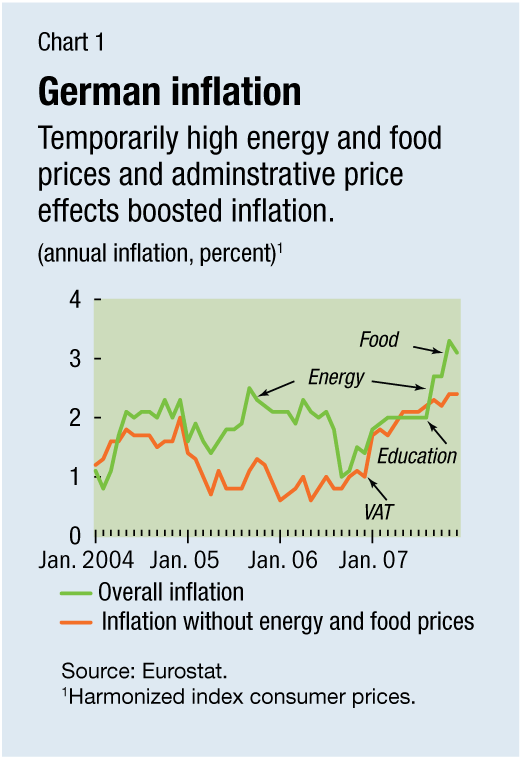
Typical street scene in Santa Ana, El Salvador. (Photo: iStock)
IMF Survey: German Inflation Should Not Cause Major Worries
February 27, 2008
- Germany's inflation accelerated in 2007 but could have been worse
- VAT hike and higher energy and food prices underlie the pickup
- Inflation likely to ease in 2008, but wage demands could maintain price pressures
In recent years, price stability in the euro area has benefited from low inflation in Germany.

A customer inspects organic vegetables at a supermarket in Frankfurt, Germany. The main unanticipated factors drivng headine inflation in 2007 were higher energy and food prices. (photo: DPA)
Euro area
But that changed in 2007, when inflation in Europe's largest economy accelerated sharply, hitting a peak of 3.3 percent in November and averaging 2.3 percent during the year.
Although German inflation fell back to 3 percent in January 2008, the rise has caused worries in Europe because euro area inflation is running above the target, set by the European Central Bank (ECB), of just under 2 percent.
Several effects were in play that pushed up inflation rates (headline, and core, which excludes food and energy prices) in a way that has not been seen in recent years. Here, inflation is measured by the harmonized index, an indicator used to assess price stability in the euro area.
Piling up of effects
The most prominent, and expected, driver of headline inflation in 2007 was the 3 percentage point increase in the value-added tax (VAT) rate on January 1, 2007 (see Chart 1). Most analysts expected a significant rise in inflation, with possible second-round effects. Instead, the impact on inflation in 2007 was more muted: the VAT increase added only about ½ percent to total inflation.
The main unanticipated factors driving headline inflation in 2007 were higher energy and food prices. They triggered an acceleration since September and contributed about 2/3 percentage point to the uptick in inflation. The appreciation of the euro against the U.S. dollar helped mitigate the pressure from mounting oil prices.
In April 2007, administrative price increases—the introduction of new education fees in some states—were responsible for another 0.1 percentage point of last year's increase in inflation.

Limited VAT effect
Many suppliers in Germany had already raised prices in 2006 in anticipation of higher demand because of the increased VAT, thereby easing the impact of the VAT hike on inflation at the actual implementation, in January 2007 (see Chart 2). Until August 2006, the difference in inflation rates between items liable to and not liable to the VAT was stable. Beginning September 2006, however, as consumers started to bring purchases forward, producers also began to incrementally increase their prices to take advantage of the greater demand.
In contrast, increases in inflation in VAT items in the rest of the euro area are attributed only to cyclical position (less visible in Chart 2). The IMF estimates that German core inflation in 2006 crept up by 0.3 percent in anticipation of the VAT hike. When the new VAT rate was adopted in 2007, inflation in Germany jumped another 0.7 percent, which was a smaller increase than expected.

Thus, although 2007 promised a significant inflation increase because of the hike in the VAT rate, the actual increase was driven to a larger extent by other effects. In other words, Germany avoided the perfect storm because producers, having begun to raise prices in late 2006, passed through only half of the VAT rate increase in 2007.
Wages and inflation
There are three reasons why inflation may begin to ease. First, administrative price increases will not be repeated in 2008. Second, the implementation effects of the VAT hike will no longer be felt, and, third, the euro appreciation and a slowdown of global and German growth may weaken demand and cause resource prices (energy and food) to decline. In total, these effects could lower the inflation rate by up to ½ of 1 percentage point.
However, wages are likely to rise significantly in 2008. Recent wage bargaining rounds have not incorporated the full VAT increase and did not anticipate the rapid rise in energy and food prices. As in the past, Germany's current wage round started with aggressive wage demands.
But this time around, wages are likely to be raised higher than in the past because unemployment has fallen precipitously and wage increases have been modest for more than a decade. Nominal increases are expected to be well above recent years' agreements of less than 2 percent and should exceed this year's productivity increases.
For the euro area, this means that some pressure on prices could come from the current round of wage negotiations in Germany. But there is also good news: the inflation rate is bound to decline when the VAT and administrative price increases wear off in the first four months of 2008.
Continued energy and food price inflation naturally poses upside risks, as do high wage settlements in the other European countries. So, all in all, the inflation outlook for Germany, and its contribution to euro area inflation, may not be as bad as the latest inflation rates seem to indicate.
Comments on this article should be sent to imfsurvey@imf.org


